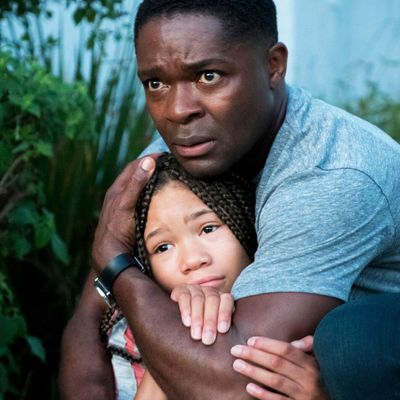
When I spoke to producer Jason Blum about Don’t Let Go, the Blumhouse-produced supernatural thriller written and directed by Jacob Estes, I asked whether the characters in the film were written as black, or if his company employed a technique known as color-blind casting. “That’s a nice way of saying it,” he told me. “It was written from a color-blind perspective. It was probably written white.” It shows.
The problem with color-blind writing is it suggests race is inconsequential to the lives we lead. It is as if Hollywood believes that blackness can be shrugged off, exorcised from the lives of characters. There’s a sense that blackness doesn’t matter if stories aren’t explicitly about race and racial strife, which is an intense failure of imagination and empathy. Race affects our understanding of ourselves, our world, and where we map into it. How could it not influence how we move and who we are in ways both minute and grand?
In Don’t Let Go, the color-blind writing is most evident in how anonymous and indistinct the characters feel. Set in a drearily anonymous vision of Los Angeles, the movie centers on Jack Radcliff (David Oyelowo), a detective whose family is brutally murdered, including his beloved niece, Ashley (Storm Reid). But just as Jack begins blunting his grief with alcohol, he starts to get calls from Ashley. He questions his sanity as the Ashley on the other end of the line claims to be living in the past, days before her murder. Then Jack barrels into trying to solve her case, rewrite the past, and somehow still shelter his niece from the future he knows.
The central conceit arrives with a wealth of questions about grief, the nature of time, and what it means to rewrite your own narrative. But Don’t Let Go is a slog. I wish it loosened up, better balanced the potential fear, joy, wonder, and delight spooling out of its premise to yield a more adventurous result. Instead, it carries itself with dread and stilted seriousness, alleviated only by noteworthy performances from Reid and Oyelowo. The two actors display a warmth and tenderness that infuse the film with its few sparks of genuine feeling. But in the end, their characters are more action figures, moved in ways the color-blind plot demands, less living and breathing creations. How can we care about anyone’s past if we don’t know who they are in the first place?
The visual landscape of Don’t Let Go undercuts its own potential, further weighing down what could have been a thrilling, time-bending investigation. Handheld camera work is meant to add grit and suspense to a series of scenes that hang their most important stakes on two people talking on the phone for long stretches of time. Los Angeles is rendered with a sickly, muted sheen. The blocking of the actors leeches the drama upon which certain scenes in the last act rely. Genuine moments of tension, like when Ashley is caught spying on her father’s criminal entanglements and only narrowly escapes, are rendered listless by the decisions Estes and cinematographer Sharone Meir make in constructing such a joyless-looking film.
But again, Jack and Ashley have a dynamic that is a pleasure to watch. Oyelowo and Reid charge the movie with a warm, familial chemistry from the start. Their dynamic — fierce devotion from the uncle, spunky energy from the niece — bolsters the rotely written scenes of Jack plucking Ashley from a life of mild neglect, if only to take her to a diner. Other actors in the film fare worse. Brian Tyree Henry as Garret Radcliff, Ashley’s father and Jack’s brother, is especially underutilized, which is a shame given his lightning-bright talent and presence. Mykelti Williamson as fellow detective and family friend, Bobby, gets lost in the morass of the last act, which shifts the film from supernatural thriller with notes of family melodrama to a cop drama defined by subterfuge and double crossing.
What problems exist in the film can’t be laid at the feet of the actors but the convoluted, prosaic script which inadvertently reveals the limits of color-blind casting and writing. Which is a reminder that blackness shouldn’t be stripped from the life of the characters but imbued in the film to give it the distinction it so desperately needs.


